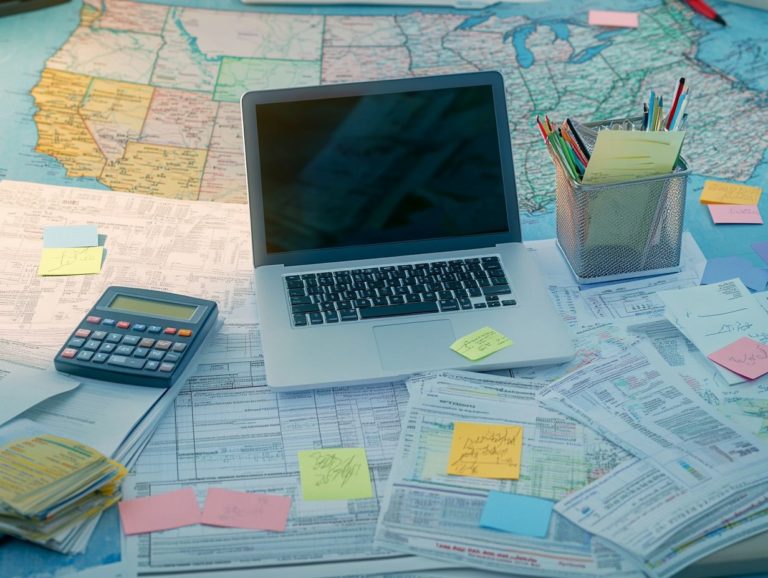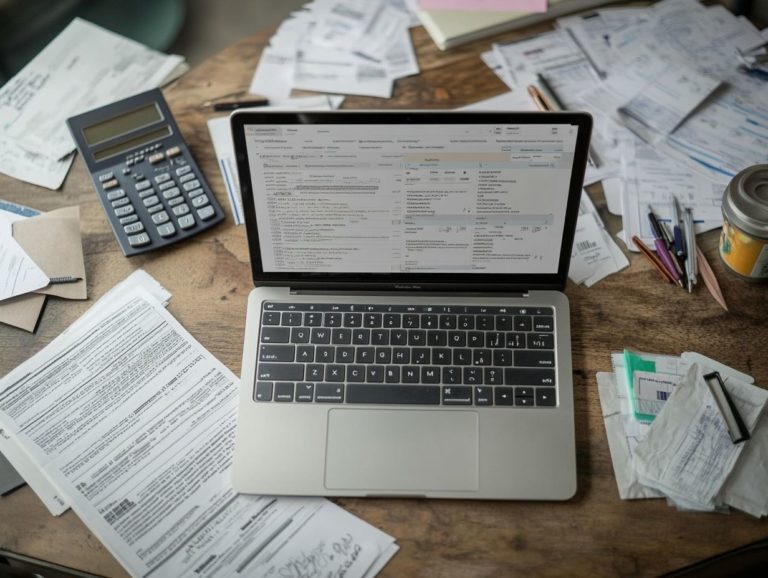Freelancer Tax Tips: Make the Most of Your Refund
Navigating the world of freelance taxes can indeed feel daunting. However, grasping the crucial elements can profoundly impact your financial health.
Get ready to unlock the essential tax insights you need to thrive as a freelancer! This guide focuses on strategies to maximize deductions and effectively organize your finances.
It also delves into managing estimated tax payments, steering clear of common missteps, and preparing for the possibility of an audit. Whether you re a seasoned freelancer or just embarking on your journey, these insights will empower you to retain more of your hard-earned income.
Contents
- Key Takeaways:
- Understanding Freelance Taxes
- Maximizing Your Deductions
- Organizing Your Finances for Tax Season
- Managing Estimated Tax Payments
- Common Tax Mistakes to Avoid
- Preparing for a Tax Audit
- Frequently Asked Questions
- What can I deduct as a freelancer?
- Do I need to pay self-employment tax as a freelancer?
- What’s the difference between a deduction and a credit?
- Can I deduct my home office as a freelancer?
- What are estimated quarterly taxes, and do I need to pay them as a freelancer?
- How can I maximize my tax refund as a freelancer?
Key Takeaways:
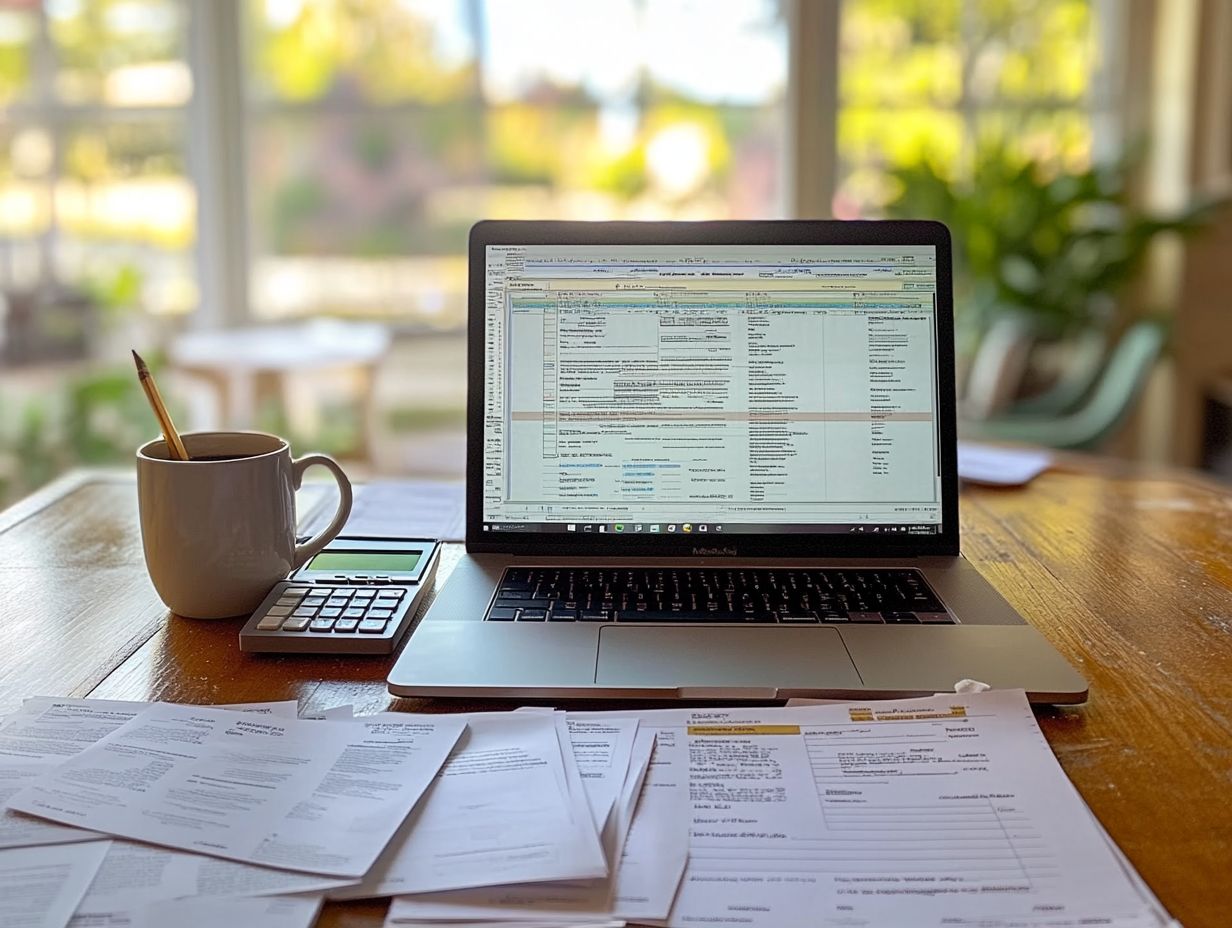
- Keep track of all your expenses to maximize deductions on your freelance taxes.
- Calculate and pay estimated taxes regularly to avoid penalties and interest.
- Stay organized to ensure you are prepared for a potential tax audit and avoid issues with the IRS.
Understanding Freelance Taxes
Understanding freelance taxes is essential for anyone navigating the gig economy. As a freelancer, you face unique challenges that traditional employees often sidestep, such as managing your own tax deductions, tracking receipts, and adhering to IRS guidelines for self-employment (which means earning income without being an employee).
It s imperative to stay on top of tax filing deadlines and grasp the intricacies of freelance income. This includes accurately reporting your business earnings and maximizing your deductions through effective bookkeeping practices and the right accounting services.
With this knowledge, you can confidently maneuver the complexities of freelance taxation.
What You Need to Know About Taxes as a Freelancer
As a freelancer, it s vital for you to grasp the various tax forms and the income reporting process. Doing so helps you avoid unnecessary tax liabilities and ensures you remain compliant with IRS regulations.
One of the key forms you should be familiar with is the 1099, particularly the 1099-NEC. This form is issued by clients when they pay you $600 or more for your services. To maximize your understanding of tax obligations, consider reviewing freelancer tax tips for first-time filers. It serves as essential documentation for reporting your income, making it crucial to track those payments meticulously.
Estimating your taxes can feel overwhelming, so it’s wise to set aside a portion of your income for quarterly tax payments. To make the process smoother, consider following 5 essential tax tips for creative freelancers. This precaution can save you from any unpleasant surprises come tax time.
Working with a Certified Public Accountant (CPA) can also simplify your tax process. They can provide valuable insights into deductions and credits that may not be immediately obvious to you, ultimately helping you maximize your earnings while keeping everything above board. Additionally, learning about the top tax mistakes freelancers make and how to avoid them can further enhance your financial management.
Maximizing Your Deductions
Maximizing your deductions is crucial for freelancers seeking to lower taxable income and minimize overall tax liability. It s particularly important to grasp what qualifies as deductible expenses in the realm of self-employment.
Understanding these nuances can significantly impact your financial landscape, allowing you to keep more of your hard-earned money while navigating the complexities of tax obligations.
Expenses You Can Write Off
As a freelancer, you can write off a range of expenses that significantly benefit your bottom line. This includes business costs associated with your home office, vehicle deductions for any business travel, and communication expenses incurred while serving your clients.
Beyond these common categories, you can also deduct costs related to equipment purchases, software subscriptions, and even continuing education that enhances your skills in your field. To maximize these deductions, it’s essential to track your expenses meticulously throughout the year. For tax planning tips for new freelancers, consider using bookkeeping software or maintaining a detailed spreadsheet to record each transaction, and don’t forget to keep those receipts for verification.
Be mindful of specific limitations, such as the stipulation that home office deductions are only valid if the space is used exclusively for work. Familiarizing yourself with these nuances ensures compliance with IRS guidelines and allows you to take full advantage of freelancer tax strategies for increased savings available to you.
Organizing Your Finances for Tax Season
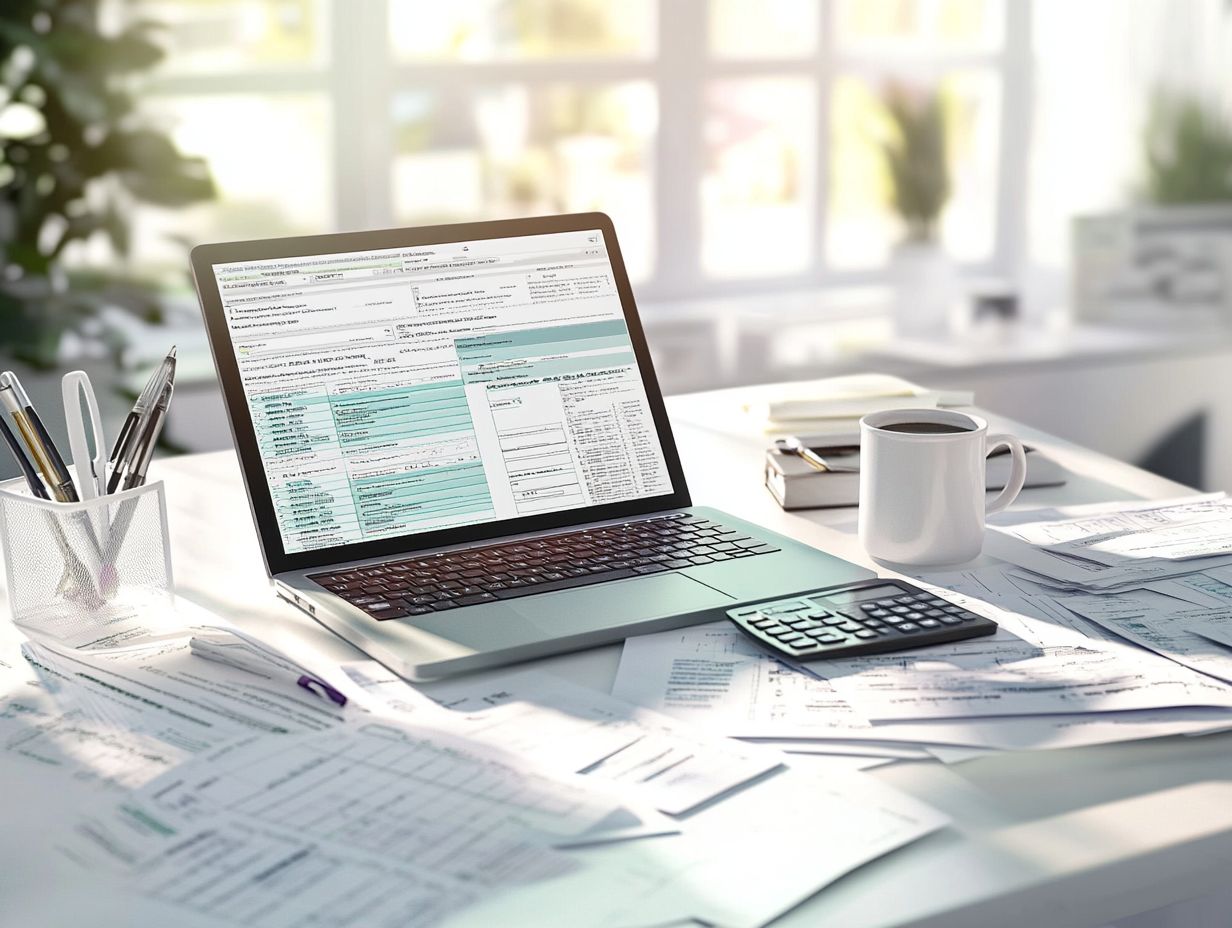
Organizing your finances for tax season can significantly alleviate the time and stress freelancers often face. By maintaining detailed online records and implementing effective expense tracking methods throughout the year, you set yourself up for a smoother, more efficient tax experience.
Tips for Keeping Track of Income and Expenses
Keeping a precise record of your income and expenses is crucial as a freelancer. It simplifies expense reporting and helps you remain compliant when tackling tax forms during tax season.
Using bookkeeping software can elevate this process, allowing you to categorize transactions effortlessly and generate insightful reports. With digital records at your fingertips, you can access essential financial data anytime, alleviating the stress that often comes with last-minute tax preparations. Additionally, being aware of freelancer tax deductions can further simplify your financial management.
Get ahead of the game! Establishing a routine for regular financial reviews whether monthly or quarterly can enhance your organization significantly. This strategy keeps your finances in check and uncovers potential areas for savings and revenue growth, including utilizing tax tips for freelancers in the gig economy, enabling you to make more informed decisions.
Managing Estimated Tax Payments
Managing estimated tax payments is essential for your tax planning as a freelancer. You re typically required to make quarterly tax payments to avoid underpayment penalties and handle your overall tax liability carefully.
This proactive approach helps you stay compliant and manage your finances effectively throughout the year.
How to Calculate and Pay Estimated Taxes
To calculate and pay your estimated taxes as a freelancer, start with a clear understanding of your expected income for the year. Apply the appropriate self-employment tax rate (the tax rate applied to income earned by individuals who work for themselves) and follow IRS guidelines for payment schedules.
This journey begins with a realistic forecast of your earnings, considering potential fluctuations that may arise throughout the year. Once you’ve established your income projection, utilize IRS Form 1040-ES, which includes helpful worksheets for estimating your taxes.
It s wise to explore IRS resources, such as their official website and various publications, which provide invaluable insights into your tax responsibilities.
Understanding the implications of miscalculating or neglecting timely payments is essential. Penalties can accumulate over time, creating unnecessary financial strain that is best avoided.
Common Tax Mistakes to Avoid
Avoiding common tax mistakes can save you money and reduce headaches with the IRS. It s crucial for freelancers like you to be aware of these potential pitfalls during the tax filing process.
Errors to Watch Out For and How to Fix Them

As a freelancer, you must remain vigilant about tax errors, as these can lead to audits or fines. Knowing how to correct mistakes efficiently can save you from unnecessary stress and wasted time.
Common pitfalls include misclassifying business expenses, neglecting to report all income, or failing to maintain accurate records. These errors can jeopardize your financial health and hinder your future growth.
To tackle these challenges, establish a meticulous system for tracking income and expenses. Leveraging accounting software can greatly simplify your record-keeping.
Consider talking to a CPA or tax professional for tailored advice, ensuring that any mistakes are addressed promptly and effectively while providing guidance to help prevent similar issues in the future. They can also help you understand maximizing deductions specific to freelancers.
Preparing for a Tax Audit
Preparing for a tax audit means keeping meticulous documentation and having a solid grasp of IRS procedures. This ensures that when the time comes, you can effortlessly provide the necessary information to tax professionals if required.
By staying organized and informed, you position yourself for a smoother auditing process.
Steps to Take if You are Audited by the IRS
Facing an IRS audit? Stay calm and organized! Here s how to tackle it with confidence.
Organize your documents. This includes tax returns, receipts, and any correspondence related to your business finances. Respond promptly to IRS notices. This shows you are willing to cooperate and keeps communication smooth.
For freelancers in this predicament, consulting with a tax professional is essential. They can provide invaluable support and help you interpret IRS requests.
Frequently Asked Questions
What can I deduct as a freelancer?
As a freelancer, you can deduct various expenses related to your business like office supplies, advertising costs, travel expenses, and professional development courses. Keep detailed records and only deduct necessary expenses directly related to your business.
Do I need to pay self-employment tax as a freelancer?
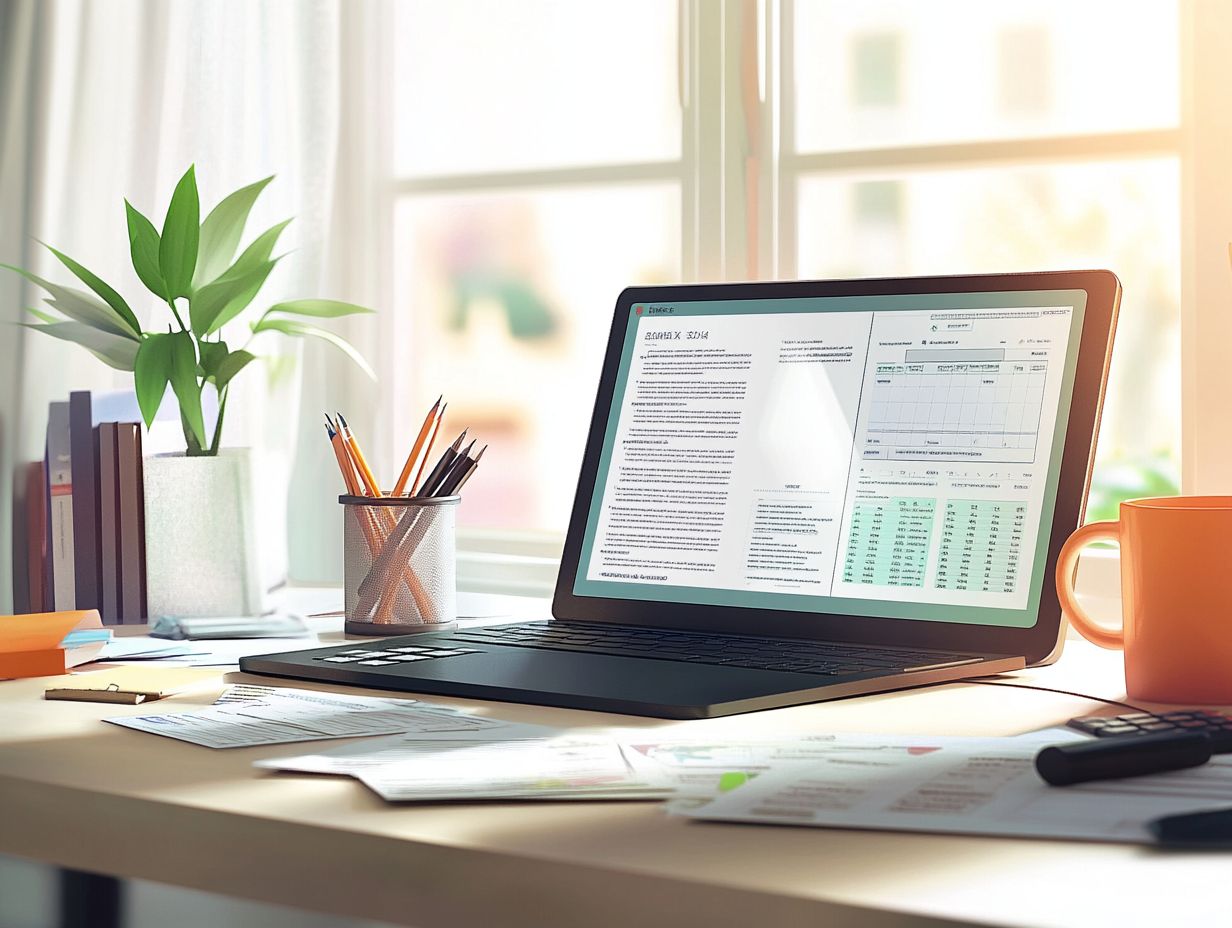
Yes, as a freelancer, you are considered self-employed and must pay self-employment tax on your net earnings. This tax covers Social Security and Medicare, so it s important to set aside a portion of your income for these taxes.
What’s the difference between a deduction and a credit?
A deduction reduces your taxable income, while a credit directly lowers your tax bill. For example, a $1,000 deduction in the 25% tax bracket saves you $250 in taxes. Conversely, a $1,000 credit reduces your tax liability by $1,000.
Can I deduct my home office as a freelancer?
If you use a designated space in your home exclusively for business, you may deduct a portion of your home expenses, such as rent, mortgage interest, utilities, and insurance. This deduction is based on the square footage of your home office compared to your total home size.
What are estimated quarterly taxes, and do I need to pay them as a freelancer?
Estimated quarterly taxes are payments made to the IRS each quarter to cover your tax liability as a self-employed individual. If you expect to owe $1,000 or more in taxes for the year, you are responsible for these payments.
How can I maximize my tax refund as a freelancer?
To maximize your tax refund as a freelancer, keep detailed records of your business expenses and stay organized throughout the year. Take advantage of all available deductions and credits. Consider working with a tax professional who can help you strategize and plan for tax season.
Don’t delay start gathering your documents today to make tax season easier!



